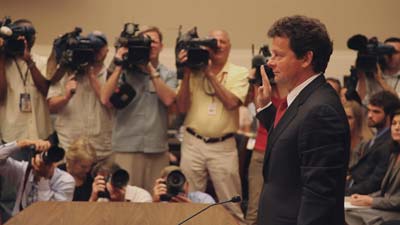Introduction
October 26, 2010

Then-BP CEO Tony Hayward testifying before Congress, June 17, 2010
Over the past decade, BP vaulted from an energy "also-ran" to one of the biggest companies in the world, gobbling up competitors in a series of mergers that delivered handsome profits for shareholders. But an investigation by FRONTLINE and the nonprofit newsroom ProPublica shows that BP's leadership failed to create a culture of safety in the massive new company. As BP took increasingly big risks to find oil and extract it, the company left behind a trail of mounting problems: deadly accidents, disastrous spills, countless safety violations. Each time, BP acknowledged the wider flaws in its culture and promised to do better. The FRONTLINE/ProPublica investigation shows that the rhetoric was empty. From the refineries to the oil fields to the Gulf of Mexico, BP workers understood that profits came first.
Through interviews with current and former employees and executives, government regulators and safety experts, FRONTLINE correspondent Martin Smith (The Quake, The Storm) and ProPublica reporter Abrahm Lustgarten examine the trail that led to the disaster in the gulf.
"It was the corporate culture that was at fault," David Uhlmann, former head of the Environmental Crimes Section of the Department of Justice, tells FRONTLINE. "It was the company that did not have the necessary commitment to environmental compliance and worker safety."
The Spill takes viewers from BP's vast oil fields in Alaska to its refineries in Texas, and to BP's trading rooms in New York and London, uncovering an unusually high number of safety violations and incidents that should have raised red flags.
The disaster at BP's Texas City refinery in March 2005 was one of the worst refinery explosions in U.S. history, killing 15 people. Government and independent investigators ultimately determined that cost cutting played a role in the explosion, and BP promised to reform. BP's chief executive at the time, Lord John Browne, said BP would learn to take safety more seriously. When it comes to safety, he said, "BP gets it." But the trouble continued.
In 2006, a corroded BP pipeline ruptured in Alaska, spilling more than 200,000 gallons of oil -- this despite several internal and external reports, obtained by ProPublica and FRONTLINE, which warned that if BP did not improve maintenance and inspections it could lead to a spill.
"When you start finding the same problems over and over again," says Jordan Barab, deputy assistant secretary of labor for the Occupational Safety and Health Administration, "I think you were pretty safe in saying they've got a systemic problem."
Meanwhile, regulators may not have been doing enough to prevent future accidents. The disaster in the Gulf of Mexico further underscores the fact that the government underestimated the possible costs and consequences of lax enforcement.
"We obviously understand now that things can go wrong," said White House energy adviser Carol Browner.

COMMENTS
blog comments powered by DisqusIn order to foster a civil and literate discussion that respects all participants, FRONTLINE has the following guidelines for commentary. By submitting comments here, you are consenting to these rules:
Readers' comments that include profanity, obscenity, personal attacks, harassment, or are defamatory, sexist, racist, violate a third party's right to privacy, or are otherwise inappropriate, will be removed. Entries that are unsigned or are "signed" by someone other than the actual author will be removed. We reserve the right to not post comments that are more than 400 words. We will take steps to block users who repeatedly violate our commenting rules, terms of use, or privacy policies. You are fully responsible for your comments.